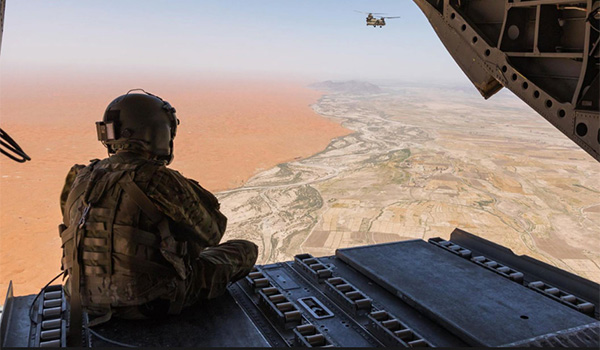
Ask the Flight Surgeon / By CPT Steven E. Brown, D.O.: Q: I was prescribed an antidepressant medication but I’m not depressed.

U.S. ARMY PHOTO BY CAPT. BRIAN HARRIS
FS: The term antidepressant is a misnomer. While it is true that antidepressant medications are used to treat depression, they are also used to treat a wide variety of psychiatric disorders. Post-traumatic stress disorder (PTSD), eating disorders, anxiety and even premenstrual syndrome can be effectively treated with antidepressants under the right circumstances. Medication, however, is certainly not the only treatment option for any of these problems. With the help of a trained professional, lifestyle changes and behavioral therapy are first-line treatment options for most psychiatric disorders. Sometimes medication is the sole treatment option, but research shows that the combination of antidepressants and behavioral therapy is most effective in the majority of cases.
Why Should My Mood
Concern My Flight Surgeon?
Mood disorders and other psychiatric problems encompass more than just your mood. Mood disorders often affect your attention span, energy level, fine motor coordination and your ability to sleep. Clearly these are concerning symptoms when it comes to operating an aircraft, planning a mission or communicating over the radio. Ups and downs in mood or temperament are normal and are usually dependent on stress levels and life circumstances. On the contrary, significant mood changes should be addressed early to try to discern and correct the underlying cause. If you are feeling depressed, anxious, overly fatigued, uninterested in usual pleasures, or any other concerning behavioral symptoms, make an appointment with your flight surgeon and/or your aeromedical psychologist to be evaluated.
What are Antidepressants?
The term “antidepressant” is a very broad and vague description of a large class of medications. There are several sub-categories within this class; each category works differently within the body. The most commonly used and most widely effective category is that of selective serotonin reuptake inhibitors or SSRIs. Serotonin is a chemical (neurotransmitter) used by nerve cells within the brain and elsewhere to communicate with other nerves. SSRIs (such as sertraline, fluoxetine and citalopram) work by effectively increasing the amount of serotonin that is presented by one nerve to another. Interestingly, this chemical change does not have immediate consequences. When taken regularly, the nerves adapt within 2 to 6 weeks and patients experience therapeutic benefits. Other common antidepressant categories include selective norepinephrine reuptake inhibitors (SNRIs) and selective monoamine reuptake inhibitors (SMRIs); these act on different neurotransmitters, but otherwise work similarly to SSRIs.
Are SSRI’s Safe?
One of the reasons SSRIs are frequently used for psychiatric disorders is because they are generally safe, effective and well-tolerated. Although there are many potential side effects, they are relatively benign compared to other mood-stabilizing medications. Not everyone will experience adverse effects, but among the most common are drowsiness, sexual dysfunction, weight gain, dizziness, headache and nausea. These vary with medication type and are usually dependent on the dosage. Fortunately, side effects oftentimes resolve spontaneously after the first few weeks to months after starting the medication. Although rare, more serious side effects may also occur. Generally speaking though, SSRIs are a safe option in the otherwise healthy Army population.
Is My Flying Career Over?
Due to the symptoms discussed above, a psychiatric diagnosis (like major depressive disorder, generalized anxiety disorder or PTSD) should be taken seriously and will almost certainly result in initial grounding. However, it may not be permanent. Waivers can be considered on an individual basis for certain diagnoses and medications, specifically SSRIs. Since these conditions are not quickly treated, the waiver process can take 6 months or more and is dependent on the aviator’s response to therapy and treatment. Waiver requirements include psychiatric evaluation, specialized thought-process testing, an in-flight performance evaluation and, if on medication, a minimum of 4 months on a stable dose. This downtime is to ensure that no aeromedically significant symptoms are present either from the underlying disorder or from medication side effects, and that the individual can safely and adequately perform his or her aviation duties. Naturally, an aviator will want to expedite this process in an attempt to return to full-flying duties as soon as possible. This hurried approach is not recommended however and is more likely to result in a waiver denial. The most important piece is that the individual takes the time and uses the medical resources available to get better and improve his or her quality of life. Once this is accomplished, an individual has a higher chance of getting a waiver, and with proper follow up, sustaining the waiver to remain on flight status long-term. Dr. Brown
See your unit flight surgeon for your personal health issues. The views and opinions offered are those of the author and researchers and should not be construed as an official Department of the Army position unless otherwise stated.
CPT (Dr.) Steven E. Brown is a flight surgeon at the U.S. Army School of Aviation Medicine, Fort Rucker, AL.








